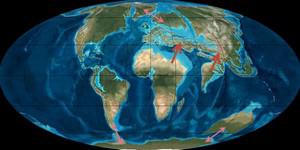Climate threatsClimate change changing Earth’s landscape
Climate change will replace land use change as the major driver of changes in Earth’s biosphere in the twenty-first century if greenhouse gas emissions aren’t curbed, new research suggests. Historically, human land use change, like urban development and agricultural expansion, has been the primary cause of anthropogenic ecosystem change. But now, due to rising greenhouse gas levels, climate change has become a growing threat to ecosystems. The rapid pace of climate change is making it difficult for species to adapt to changes in temperature, water cycles, and other environmental conditions that affect life on Earth.

An example of projected change in earth's landscape // Source: yahoo.com
Climate change will replace land use change as the major driver of changes in Earth’s biosphere in the twenty-first century if greenhouse gas emissions aren’t curbed, new research suggests. Historically, human land use change, like urban development and agricultural expansion, has been the primary cause of anthropogenic ecosystem change. For example, more than 4.5 billion hectares (17.4 million square miles) of the planet has been converted into land for growing crops and feeding livestock, roughly 30 percent of Earth’s land surface area.
But now, due to rising greenhouse gas levels, climate change has become a growing threat to ecosystems. The rapid pace of climate change is making it difficult for species to adapt to changes in temperature, water cycles, and other environmental conditions that affect life on Earth.
To address the risk of climate change, the world’s nations adopted the Paris Agreement in 2015, an international pledge to limit global warming below 2 degrees Celsius (3.6 degrees Fahrenheit) above pre-industrial levels. AGU says that in a new study published in Earth’s Future, a journal of the American Geophysical Union, researchers developed computer simulations that illustrate how the success or failure of the Paris Agreement would impact Earth’s land ecosystems.
According to this new research, if the international community fails to reach their regulatory goal, climate change will likely replace land use change as the biggest catalyst for major changes to the planet’s ecological landscape.
Land use change has already interfered with important ecological systems and put species at risk of extinction. Scientists are concerned that climate change’s growing contribution to landscape change will deal even more damage to Earth’s biosphere.
“Think of the impacts that have already been caused by land use change. Now imagine that climate change impacts will likely be even bigger than that by the end of this century,” said Sebastian Ostberg, a geoecologist at the Potsdam Institute for Climate Impact Research in Potsdam, Germany and lead author of the new study.
